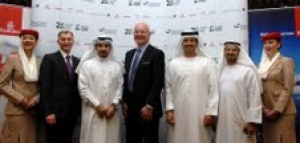ATM highlights next decade of opportunity for region

UAE, Oman, Qatar and Saudi Arabia are leading the race for tourist revenue growth with positive outlook for the industry as governments use tourism as major anchor for economic diversification
Arabian Travel Market 2013 will look toward this future as it opens to celebrate its 20th edition and welcome over 2,500 exhibitors from 87 countries in Dubai.
Speaking ahead of this year’s showcase, Mark Walsh, portfolio director, Reed Travel Exhibitions, highlighted the World Travel & Tourism Council (WTTC) Economic Impact 2013 outlook, which supports positive forecast for industry development and performance in the region this year.
“The regional tourism map is now incredibly diverse with travel and tourism directly contributing US$76.6 billion to GDP in 2013, which is forecast to rise by 4.2 per cent this year alone as ongoing investment into the sector and infrastructure development in key markets supports the dual long term goals of driving visitor numbers and moving towards sustainable economic diversification,” said Walsh.
He also emphasised the growth of a number of regional destinations, in particular the UAE, Oman, Qatar and Saudi Arabia.
“The UAE has long been a role model for regional tourism development, and recently released figures from the WTTC show that tourism in the Emirates is growing significantly faster than the world GDP growth average, contributing an impressive 14 per cent to the UAE economy in 2012, - compared to the global trend of nine per cent - and expected to rise by 3.2 per cent in 2013,” he said.
Industry investment, which hit US$22.5 billion last year is also set to increase in 2013, by an estimated 12 per cent, as the country fully embraces the social and economic benefits of tourism, maximising on the ongoing expansion of its airline route networks, and a healthy economic outlook.
The UAE’s nearest neighbour, the Sultanate of Oman is also pursuing plans for tourism growth spurred by the government’s US$39 million investment into development of Dhofar province, with the aim of making its annual Khareef (monsoon) festival an in-demand fixture on the global tourism calendar.
This is supported by forecasted hotel room capacity growth at a CAGR of 5.3 per cent between now and 2016, which will see Oman swell its current base of 5,331 rooms by an additional 2,000 before the end of this year.
One of the fastest growing markets in the Gulf, Qatar is also moving ahead with its US$65 billion investment plan that focuses on the state’s hosting of the 2022 FIFA World Cup.
Over 85,000 new hotel rooms will bolster current inventory levels as Qatar looks to welcome as many as 3.7 million visitors per annum by the time the tournament kicks off.
“Saudi Arabia is an extremely interesting market at the moment, and there is a strong push towards development of domestic tourism with 22.5 million residents looking for new experiences aside from the favoured summer destination of Jeddah, as well as undertaking their Hajj and Umrah commitments,” said Walsh.
Hajj and Umrah travel generated US$16.5 billion for the Kingdom in 2012 and business tourism demand is also growing, particularly for Riyadh, the capital city and seat of government.
Tourist arrivals are forecast to grow at CAGR of four per cent by 2022, driven by strong growth across all sectors.
“Tourism is currently the country’s second largest industry and this has huge significance for the economy as US$80 billion worth of investment into key infrastructure projects including airport expansion, railways and roads comes to fruition in the next ten years,” remarks Walsh.

